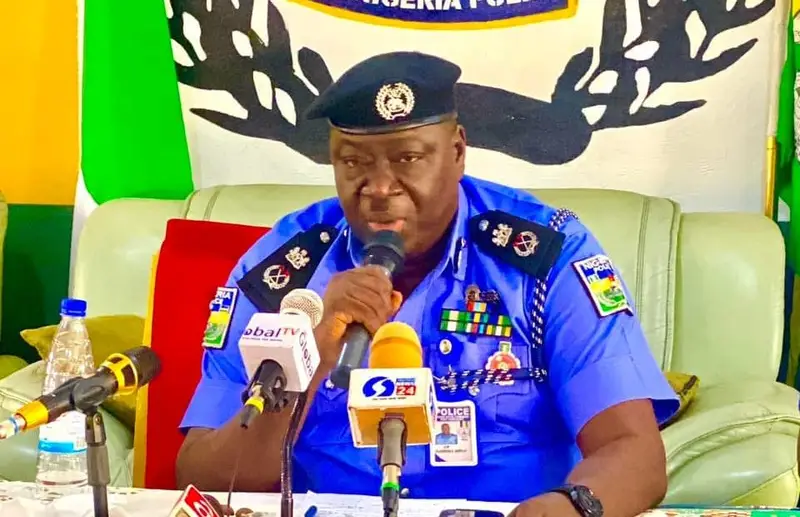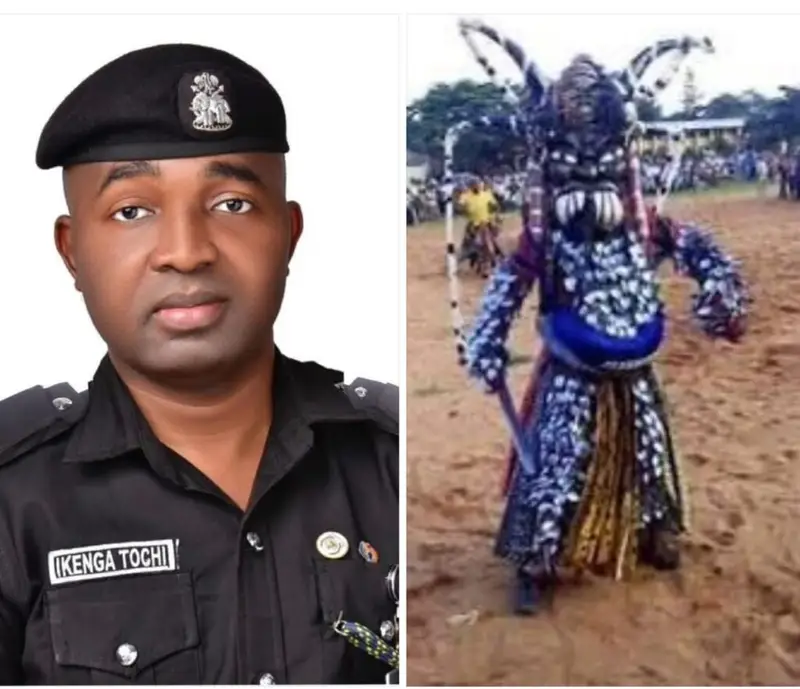
Supreme Court sits as 16 States Governors are challenging EFCC’s Establishment Act
News
Suspected notorious kidnapper linked to multiple kidnappings arrested by Police

Suspected notorious kidnapper linked to multiple kidnappings arrested by Police
The Police Command in Rivers on Wednesday, said it has arrested an alleged notorious kidnapper linked to multiple kidnapping incidents in the state.
The Command’s spokesperson, CSP Grace Iringe-Koko, disclosed this to journalists in Port Harcourt, stating that the suspect was arrested on Jan. 10.
She said that the suspect aged 30, was identified as the ringleader of a notorious kidnapping syndicate, that coordinated several abductions for ransom across the state.
According to her, the suspect who is responsible for multiple kidnappings along the Port Harcourt International Airport Road, Omagwa, was apprehended by operatives of the Command’s Anti-Cultism Unit.
“The suspect was planning to relocate his operational armoury and camp to Agbonchia/Oyigbo Road in Eleme Local Government Area before his arrest,” she said.
She said that the recovered items include an AK-47 rifle with breach number 2125 and two magazines loaded with 36 rounds of 7.62 x 39mm live ammunition.
The spokesperson said that during preliminary investigations, the suspect voluntarily confessed to being the ringleader of the kidnapping syndicate.
According to her, the suspect and exhibits are currently in police custody, while efforts are ongoing to apprehend other fleeing members of the gang. (NAN)
News
Govt suspend Doctors for leaving scissors in patient’s stomach after operation

Govt suspend Doctors for leaving scissors in patient’s stomach after operation
The Kano State Hospitals Management Board has acknowledged that the death of Aishatu Umar, a five-time mother, resulted from professional lapses at the Abubakar Imam Urology Centre, a government health facility in Kano.
According to a statement issued by the Board’s Public Relations Officer, Samira Suleiman, an internal probe initiated by the Executive Secretary, Dr. Mansur Mudi Nagoda, revealed that medical staff failed to remove surgical scissors from the patient’s body after an operation, a mistake that proved fatal.
Following the findings, the Board ordered the suspension of three staff members connected to the procedure, barring them from all clinical responsibilities with immediate effect.
The case has also been handed over to the Kano State Medical Ethics Committee, which will conduct a more detailed inquiry and determine appropriate sanctions in accordance with existing regulations and ethical guidelines.
“The Board extends its deepest condolences to the family of the late Aishatu Umar and sympathizes with them over this painful loss. We reassure the public that negligence will not be condoned in any form,” the statement read.
Aishatu Umar reportedly died after complications arising from a surgery in which surgical scissors were allegedly left in her abdomen.
Her husband, Abubakar Muhammad, said she repeatedly complained of worsening health conditions after the operation, but her concerns were not adequately addressed before her death.
The tragedy has triggered widespread anger among Kano residents, drawing attention to systemic weaknesses in supervision and accountability within public hospitals.
News
Masquerade arrested, detained by Police over alleged attack in community

Masquerade arrested, detained by Police over alleged attack in community
The Anambra Police Command says it has detained a masquerade, allegedly involved in unprovoked violent attacks on residents of Awgbu Community in Orumba North LGA of the state.
In a statement issued in Awka and made available to newsmen on Wednesday, the command’s Spokesman, SP Tochukwu Ikenga, disclosed that the incident happened on Monday.
“The Anambra Police Command wishes to inform the public, especially the people of Anambra and other concerned persons, that it has taken into custody the masquerade involved in the unprovoked and violent attacks on innocent citizens.
“The act led to a breach of public peace in Awgbu, Orumba North LGA.
“The suspect is currently in police custody, and investigations are ongoing to ensure that all those involved are brought to justice,” Ikenga added.
He described the conduct by the masquerade, as seen in the viral video currently in circulation, as “unacceptable, unlawful, and would not be tolerated under any guise”.
An eyewitness in the community told the News Agency of Nigeria (NAN) that the masquerade, accompanied by some youths, went out of its way to attack unsuspecting members of the public and destroyed people’s property.
Speaking on the condition of anonymity, he said that the incident occurred during the last “Ofala” festival in honour of the late Traditional Ruler of Awgbu, Igwe Michael Okechukwu.
NAN reports that the festival was supposed to be a solemn cultural and symbolic celebration of the life and reign of the late monarch. (NAN)
-
6 years ago
Our situation in Kano terrible – Gov Ganduje cries out
-

 News11 months ago
News11 months agoFG pledges commitment to enhance Police officers Welfare, implement Tinubu’s 8-point agenda for NPF
-

 News11 months ago
News11 months agoBREAKING; NSCDC gets approval to commence 2025 recruitment exercise
-

 News9 months ago
News9 months agoAlleged cocaine deal: Court issues orders in suspended DCP Abba Kyari’s case
-

 News12 months ago
News12 months agoDPO under investigation for allegedly taking teenage girl to his home while in police custody
-

 News12 months ago
News12 months agoJUST IN; Commissioner of Police bows out of Service
-

 News9 months ago
News9 months agoJUST IN; Police Inspector dies watching Arsenal match
-

 News12 months ago
News12 months agoBREAKING; NLC declare nationwide protest


